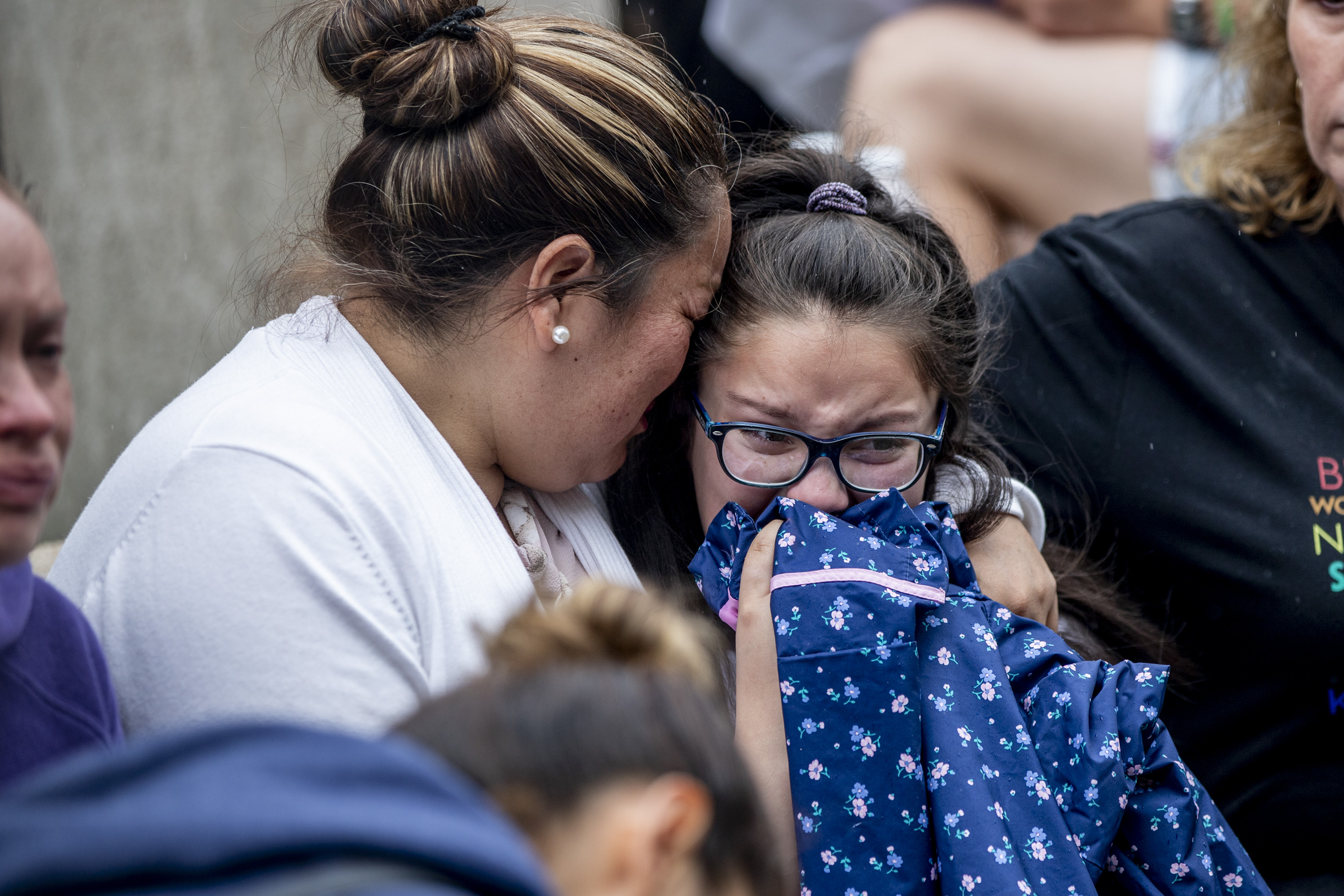
With a large crowd behind him demanding that U.S. Immigration and Customs Enforcement not detain or deport him, Jose A. Robles walked right past Department of Homeland Security officers and into an ICE office on Wednesday afternoon.
Approximately a half hour later, despite the large showing of community support, which included a prayer that “he return to us unharmed,” Robles was detained. It was not immediately clear what fate awaited him.
Robles' family, including his sister, wife and three daughters, burst into tears after learning of his detainment.
Joanne Engquist, pastor of Gethsemane Lutheran Church, the place of worship Robles had called home for the past year, wrapped her arms around the family, imploring them to keep breathing.
Asked how she was feeling after receiving news of his detainment, Robles’ sister, Rocio, simply said “mal,” or “bad” — with tears in her eyes.
A few moments later, rain pounded the pavement outside the DHS building, where the ICE offices are housed.
“I’m very disappointed, obviously,” said Engquist.
“I’m so sad, especially for his family,” she added, while noting that ICE’s decision to detain Robles would impact the whole community who had shown up to support him.
Robles and throngs of supporters had walked approximately a mile from Riverton Park United Methodist Church to the DHS building, chanting and waving signs. “We are not illegal, we are people,” they sang. Some wore T-shirts that said “families belong together.” “Stop criminalizing desperation,” one sign read.
Dennis Barnes, a 66-year-old resident of Lake Forest Park, had volunteered to drive supporters to the ICE office in a shuttle.
“I’m ashamed for the policies of our country,” Barnes said when asked why he was supporting Robles. “I’m sympathetic to the plights of the families who are caught in this.”
“I wish I didn’t have to be here, but I think it’s important to show up,” said Barnes, who noted he had been corresponding with a man in prison, also caught up in immigration proceedings, for more than two years.
“I think it’s important as a clergy person to stand up for people who are not being treated adequately by our government,” said Laura Harris-Ferree, an interim pastor at Luther Memorial Lutheran Church in North Seattle.
“Scripture says that we are to care for those who come to us in need,” she continued. “The Bible defies borders and boundaries all the time.”
Wearing a white cap featuring a solidarity fist, Robles had addressed his supporters before starting the march. He received a standing ovation before uttering a word. Speaking briefly, Robles said he was “ready to take this step.”
Robles explained that he needed medical attention and was suffering from depression.
“We love you,” one person in the crowd shouted.
His lawyer, Sandy Restrepo, an attorney with Colectiva Legal del Pueblo (People's Law Collective) in Burien, said, “They’ve taken so much from us that they’ve taken away our fear.”
Last summer, Robles took sanctuary in Gethsemane Lutheran Church in downtown Seattle.
There is a long history of churches operating as safe houses. The Bible refers to churches as cities of refuge, where those accused of murder could safely await trial. In the 19th century, churches hid runaway slaves. In the 1980s, hundreds of churches supported the so-called sanctuary movement in an attempt to save Central American refugees fleeing civil conflict from deportation.
ICE generally avoids churches because they are considered “sensitive locations,” as are schools and hospitals.
Recently, however, there have been reports of ICE fining those who have taken sanctuary in houses of worship hundreds of thousands of dollars in civil penalties for disobeying orders to leave the country.
Robles had taken sanctuary on the same day he was supposed to board a plane headed for his home country of Mexico, a country he left approximately 20 years ago. A second man, Jaime Sulficio, took sanctuary in a Seattle church in March.
Robles, who had been living in Lakewood with his family, co-owns a painting company with his brother Victor. He’s been fighting the deportation process for approximately nine years. Robles claimed his immigration case began after he was caught driving with a suspended license. But according to a report in The Seattle Times, Robles was twice charged with misdemeanor assault. The charges were later dismissed.
In April 2018, Robles and his brother were held at gunpoint and thrown into the bathroom of a barbershop that was robbed. After the robbery, Robles applied for a U visa — a type set aside for victims of crimes who have assisted law enforcement in an investigation.
The Pierce County Prosecutor's Office signed off on Robles’ U visa, but U.S. Citizenship and Immigration Services has yet to approve it. If approved, the U visa would halt Robles’ deportation proceedings.
Robles also has an appeal — a cancellation of removal — pending in the 9th Circuit Court of Appeals. Robles has been in the U.S. more than 10 years and has a dependent under 21 who is a U.S. citizen (his youngest daughter), which Restrepo explained qualifies Robles for a form of relief that would allow him to remain in the United States.

Restrepo said ICE officials had indicated they were detaining Robles but not deporting him.
Addressing reporters after his arrest, Restrepo called the event “another phase of the battle.” She said the next step would be to ask for parole or bond so that Robles could go home as his immigration case proceeds.
Stephanie Johnson, 32, who works at a nonprofit and lives in Seattle, said she believes Robles’ daughters — two of whom are recipients of DACA, or Deferred Action for Childhood Arrivals — should have a shot at success, with their father by their side.
“We owe it to them to give them the best chance,” Johnson said.

















